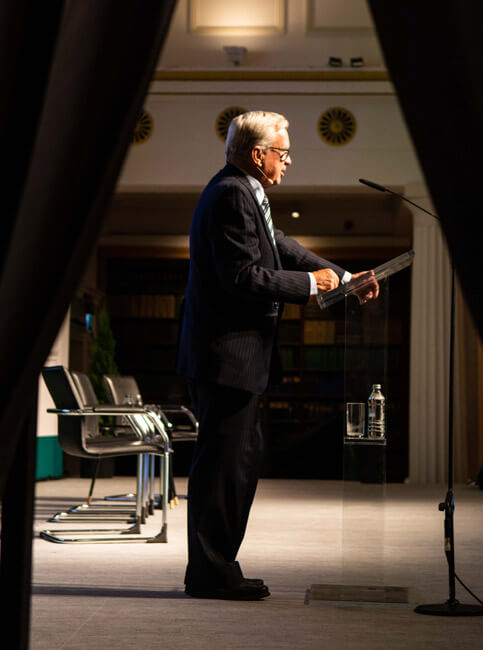Access to publicly funded healthcare for those without private health insurance in Ireland was a disgrace and the biggest risk to the Irish health service now would be to make no changes, Dr Tom Keane, Former Director of the National Cancer Control Programme and current Chair of the Sláintecare Implementation Advisory Council said, when he addressed the Conference.

He was speaking on “People, Passion, Performance, Applying learning for better healthcare.”
Dr Keane said that at present there was a level of inequality in accessing health services here that no country would tolerate and we were trying to change that with Sláintecare.
From a personal perspective there were a number of lessons learned from the Cancer Strategy Implementation 2007 – 2016, which were relevant to the Sláintecare Implementation Strategy 2018 – 2028.
There was a level of inequality in accessing health services here that no country would tolerate and we were trying to change that with Sláintecare.
The National Cancer Forum 2006 said that the then fragmented arrangements for the delivery of cancer services were not in accordance with best practice and their continuation could not be recommended.
There was a mandate for major change and a single National Programme for Cancer Control (NCCP). A separate business unit was to be established within the HSE, all cancer control services consolidated within the NCCP, all cancer funding in the public sector was to flow through the NCCP, all cancer surgery was to be consolidated within eight centres and four cancer networks (1 network/2 cancer centres) were to be developed.
Comparing the cancer and the Sláintecare changes, he said both were driven by national strategies and had a population focus. The cancer reforms were outcome and access driven, with a major focus on hospitals. In the case of Sláintecare, the reforms were access, cost and outcome driven and the major focus was away from hospitals.
The cancer developments required money, political support and a medical focus. Sláintecare required financial investment, political support and a medical, societal and political focus.
Dr Keane said there were a number of lessons to be learned from the implementation of the cancer strategy.
“The first lesson is to distinguish strategy from implementation and beware the risk of endless talk. I would rather have a good plan today than a perfect plan to morrow.
“The second lesson is to frame the implementation. It had to be accepted that The National Cancer Control Programme (NCCP) was responsible for the future NOT the past. It was necessary to demonstrate strong and committed administrative and clinical leadership and create an appropriate timeline for change.
“The third lesson was that communication was critical. It was vital to have a clear vision of the future state of service, to stay on message, to understand and engage different audiences, patients, public, professionals, colleges, and politicians and develop a coherent media strategy. I was lucky to have a great communications director in Ann McLoone.
“The fourth lesson was the power of evidence. Comparative international data on cancer outcomes was compelling, cancer intelligence on outcomes in Ireland was essential and high quality evidence was imperative to support change.
We were very lucky to have an extraordinary coterie of people who were willing to work to change to the new structure.
“The fifth lesson was to listen to the people who knew and understood the problem that you wished to address.
“The sixth lesson was that quality and safety of care must become the highest priority and clinical governance must be strengthened and embedded across the entire spectrum of clinical activity.
The seventh lesson was that we had to demonstrate and report progress, maintain momentum, be honest, open and accountable and build trust and partnerships.
“The eighth lesson was to build and maintain political support .”
Dr. Keane said major change was possible if there was a clear vision of the future state of services which was communicated well and was appropriately resourced and implemented, a plan that was based on evidence, strong clinical leadership with appropriate authority and clinical governance, robust and honest engagement with the public and clinical community and strong and ongoing political support.
Turning to Sláintecare, he said that we were very lucky to have an extraordinary coterie of people who were willing to work to change to the new structure.
Sláintecare had political support from all party groups but it had many tough recommendations to be implemented and it was understandable that there would be a political challenges in adopting and implementing some of those recommendations.
“As Health Minister, Mary Harney had a central role in making the cancer change happen. She drove it, recruited me, supported me and her political courage was never lacking. I hope that level of political support will be maintained in Sláintecare.”
In reply to a query from the audience, if he thought the political will and the investment needed were there for Sláintecare, Dr Keane said he would not have taken the job on if he didn’t think there was a real possibility of its being implemented. He said the amount of money needed was still not clear, but money was being provided and there were significant parts of Sláintecare that did not require additional money. Change must happen and substantial funds would need to be injected to turn the system around.

